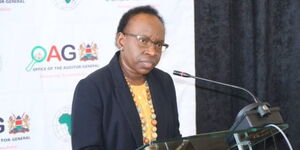A section of residents in North Imenti Constituency has begun collecting signatures in a bid to recall the area Member of Parliament, Rahim Dawood.
The residents cited four reasons for their move to recall the MP, who is currently serving his third consecutive term as North Imenti’s representative.
Among the reasons given was Dawood’s vote in support of the 2024 Finance Bill, which went against the wishes of his constituents. Another was the MP’s failure to exercise his oversight role by not condemning or raising questions in Parliament regarding the ongoing abductions and murders in the country, and in North Imenti in particular.
The third reason was Dawood’s participation and voting in what they termed as the “irregular impeachment of former Deputy President Rigathi Gachagua.” The frustrated residents also cited Dawood’s failure to lobby for budgetary allocations to complete stalled national government projects in Meru, especially roads.
The clamour for Dawood’s recall comes after the new team at the Independent Electoral and Boundaries Commission (IEBC), led by Chairperson Erastus Ethekon, was recently sworn into office.
Ethekon took the oath of office alongside six commissioners at a ceremony held at the Supreme Court building and presided over by Chief Justice Martha Koome on Friday, July 11.
During the event, Ann Njeri Nderitu, Moses Alutalala Mukhwana, Mary Karen Sorobit, Hassan Noor Hassan, Francis Odhiambo Aduol, and Fahima Araphat Abdallah were all sworn in as commissioners. Fahima was later appointed Vice Chair of the Commission.
How to Recall Your MP
The IEBC plays a critical role in the process of the recall of an MP or Member of County Assembly (MCA) in regards to receipt of the petition, verification, and subsequently conducting by-elections in the constituency or ward in which the petition was filed.
To recall an MP or MCA, the first step is to file a petition with the IEBC. The petition must be in writing and signed by a petitioner who is a registered voter in the constituency or county in which the recall is sought.
Critically, a recall can only be initiated two years after an election and not later than one year before the next General Election. Additionally, a recall petition cannot be filed against an MP or MCA more than once.
Grounds for recall include breaches of integrity under Chapter Six of the Constitution, misuse of constituency funds, or conviction for electoral offences.
The second step involves collecting the names and signatures of at least one-third of the registered voters in the constituency. Those signing in support of the recall must be registered in different parts of the constituency, not just from one ward or locality.
The third step is carried out by the IEBC, which must verify the list of names within 30 days. Within 15 days after verification, the IEBC shall issue a notice of the recall to the Speaker of the relevant House.
Within 90 days of publishing the notice to the Speaker, the IEBC must conduct a recall election (i.e. “Do you wish to recall your MP/MCA?”). This is the penultimate step before the conduct of a by-election. The recall election is decided by a simple majority of the voters who participate in the poll.
Where a recall election results in the removal of a member of Parliament, the Commission shall conduct a by-election in the affected constituency or county. Notably, an MP who has been recalled may run in the by-election.
Calls for underperforming MPs were revived after the new IEBC team was sworn into office, with Kenyans reviving a discourse that began during the 2024 anti-Finance Bill protests, when attention was drawn to poorly performing lawmakers.












